‘Red flags on top of red flags’: Problems mount for UM athletics booster John Ruiz
Even by Miami standards, John H. Ruiz has been living large.
He doesn’t buy just one waterfront mansion. He buys seven.
He doesn’t just buy a 20-seat private plane. He buys a private Boeing passenger jet.
And he doesn’t stop at buying fancy speed boats. He buys the companies that make them.
The brash attorney and entrepreneur has also become known as the sugar daddy of the University of Miami athletic program, making headlines for his company’s sponsorship of star players and bold proposals to build the university a new football stadium.
But the high living might soon be coming to an end.
The Miami Herald has learned that Ruiz and his health insurance claims company LifeWallet — previously known as MSP Recovery — are the target of federal civil and criminal investigations. The ongoing federal probes mark an unprecedented level of trouble for the one-time TV host whose business practices and out-sized lifestyle evoke comparisons to Donald Trump.
His teetering enterprise is built on a Coral Gables company that seeks to recover money paid by Medicare-affiliated insurance companies that should have been paid by a different insurance carrier.
LifeWallet was once valued at more than $32 billion, but the company is now worth a small fraction of that. Its stock, which was worth more than $10 a share right before the company went public through a special purpose acquisition company, or SPAC, merger last year now trades for less than a quarter.
Ruiz and the company are also facing several lawsuits claiming that they owe millions of dollars to the sellers of businesses they acquired.
Ruiz has weathered trouble before — he was given a public reprimand by the Florida Bar in 2011 over a legal dispute — and his Coral Gables home, an office building he owned and even his boat were all the subject of foreclosure actions a decade ago.
But his current problems are more serious.
Ruiz and LifeWallet are the target of investigations by the U.S. Securities and Exchange Commission and the U.S. Attorney’s Office for the Southern District of Florida.
The SEC declined to officially comment on whether it is investigating Ruiz’s company. But the regulatory agency indicated that MSP Recovery, doing business as LifeWallet, is currently under federal investigation in response to a Freedom of Information Act request from the Miami Herald. The SEC said it could not turn over records requested by the Herald because they had been “compiled for law enforcement purposes” and could “reasonably be expected to interfere with enforcement activities.” Sources familiar with the probe say SEC investigators are looking at what Ruiz’s company represented to investors about its value and other possible securities violations.
The Herald has also learned that multiple witnesses have been interviewed about Ruiz and his company by the U.S. Attorney’s Office in Miami. The investigation, led by FBI and IRS agents, is looking at financial representations made to investors and spending practices, according to sources. All three agencies declined to comment.
‘Potentially massive financial problems’
The events mark a stunning decline for Ruiz and the company that put him on Forbes Magazine’s annual list of billionaires last year after MSP Recovery went public in May of 2022, and later rebranded itself as LifeWallet.
The company’s stock price nosedived soon after it was listed on the NASDAQ stock exchange and it has never recovered. It had already dropped by more than two-thirds by the time Ruiz rang the NASDAQ opening bell two days after the company went public and the price would never reach that height again.

To keep the company afloat, Ruiz and Chief Legal Officer Frank Quesada loaned LifeWallet more than $100 million less than a month after it went public; meanwhile, the company has had to renegotiate with creditors for more time to pay off its debts.
Even more telling, LifeWallet’s recent financial filings with the SEC constitute “red flags on top of red flags,” said Richard Hong, a seasoned litigator who worked more than 25 years for the U.S. Attorney’s Office in Miami and the Justice Department in Washington, D.C., as well as the SEC.
LifeWallet was months late in filing its 2022 annual report, and only filed it on Thursday, July 27, after the Herald sent the firm a detailed list of questions, including why it hadn’t yet been filed.
The company had admitted in April that its earlier quarterly financial filings covering part of last year weren’t reliable.
The newly filed annual report showed that LifeWallet took in $23.4 million last year from its primary business of recovering incorrectly paid insurance claims, falling far short of the $992 million in 2022 revenue the company had projected it would earn before going public.
And the company said its assets were worth $3.4 billion at the end of 2022, a far cry from the $6.5 billion it said LifeWallet’s assets were worth in September, before it told the SEC it had to revise the numbers.
The company has not yet filed its financial report for the first quarter of 2023, which was due in May, but said it intends to file by August 7.
LifeWallet acknowledged in the just-filed annual report that its financial reporting issues “adversely affected” the business by impacting the “confidence of investors, employees, and customers“ and exposed the company to “greater risks associated with litigation, regulatory proceedings and government enforcement actions.”
Earlier, the company said in a June SEC filing that its chief financial officer, Calvin Hamstra, had resigned after holding the position for roughly a year. He was replaced on an interim basis by LifeWallet’s chief operating officer, Ricardo Rivera, who now holds both titles. The company has also admitted in filings to the SEC that it is at risk of being delisted on the NASDAQ exchange, which would make it much more difficult to trade the company’s stock.
Hong, the former prosecutor, said LifeWallet’s recently filed annual report, known as a 10-K, doesn’t ease concerns about the company.
“It is difficult for me to fathom how a reasonable investor could draw any positive takeaways about the company’s financial condition after reviewing this 10-K,” said Hong, a partner with the Morrison Cohen law firm in New York. “They have all the telltale signs of a company with potentially massive financial problems.”
Ruiz and LifeWallet declined to answer questions about the company’s delay in filing its financial reports, the departure of Hamstra or the federal investigations into Ruiz and the company, referring the Herald to the company’s filings with the SEC.
The negative publicity over LifeWallet’s SEC disclosures has already cost the company business. In late April, LifeWallet was compelled to step aside from its role handling potential claims in the 4.4-million-person class-action lawsuit against Florida Power & Light over the utility company’s “storm charges,” which were imposed before Hurricane Irma inflicted potentially billions of dollars in property damages to customers in 2017.
LifeWallet “does not appear to be in good financial shape and may not survive the duration of this lawsuit,” a lawyer for the utility asserted, according to a court document.
While Ruiz called the accusation “unequivocally false” in a court filing and wrote that FPL’s statements “were made intentionally and recklessly and filed in bad faith,” he eventually agreed to have a judge handling the case appoint another claims administrator to move the case along. His law firm is still involved as one of the legal representatives of the certified class members.
Staking their claims
The idea behind the company — created in 2014 as MSP Recovery, with the MSP standing for Medicare Secondary Payer — was to recover insurance money that Medicare-affiliated healthcare plans paid initially that should have been paid by a different insurer.
For example, if someone covered by a Medicare plan was injured in a car accident, his or her health insurance might have paid a hospital tab that should have actually been paid by a car insurance firm. In this example, Ruiz’s company would collect payment from the car insurance company and then split the proceeds with the health insurer.
In some cases, Ruiz’s company would negotiate with the health insurer for the right to buy the full value of the claim at a discount. For insurers, it meant money in their pockets immediately on a claim that might never pan out.
When the company went public, MSP Recovery said its portfolio included $1.5 trillion in billed insurance claims.
Ruiz’s company developed algorithms that it said would comb through health claims records to identify potential cases and it partnered with the big-data company Palantir Technologies to help power its analysis.
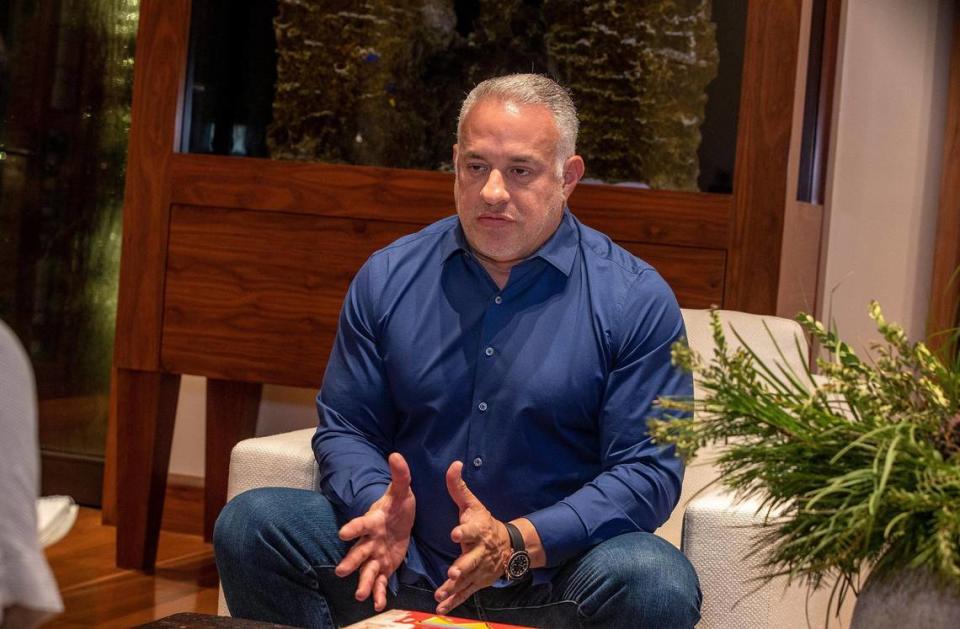
In recent years the company added other divisions, including one focused on making personal health data more accessible to consumers.
The company’s growth wasn’t always smooth. In 2016, for example, it required that all executives take a steep pay cut after the company didn’t land the full $37.5 million it had been hoping for from a legal investment firm, according to court records.
But fortunes improved the following year after a $410 million investment from a Houston-based litigation lender.
Spending spree
While Ruiz was still years away from being anointed a billionaire by Forbes, he began to spend money like one, according to public records.
Between 2018 and 2022, Ruiz and companies tied to him bought more than $150 million worth of properties, including seven in the ultra-luxe Gable Estates, according to Miami-Dade property records. One of them was a couple doors down from the $30 million mansion owned by music producer Pharrell Williams.
The centerpiece of the buying spree was a 30,000-square-foot, nine-bedroom, 14-bathroom house in Gables Estates, sitting on more than two acres of waterfront property, that Ruiz bought for $46 million in 2020.
Amassing an empire
Take a look at John Ruiz's real estate purchases in the Gables Estates.
Ruiz subsequently sold several of the properties, fetching nearly 30% more overall than he had paid for them, including one of the Gables Estates mansions that he sold to Rivera, the company’s chief operating officer and interim chief financial officer, six months after Ruiz purchased it. He and his companies still own three Gables Estates mansions.
Ruiz made headlines for his unsolicited proposals to build a new stadium for the University of Miami football team, which would be called, naturally, LifeWallet Stadium.
He and his family announced big donations to the schools where his sons Johnny and Alex had played baseball — $10 million for athletic facilities at Westminster Christian School and $2 million to upgrade the weight room at the University of Miami baseball stadium. And Ruiz told the Herald in late 2021 that he planned to donate “north of $50 million” to the University of Miami.

Ruiz also donated $1 million in July 2021 to support families of the victims of the Surfside building collapse.
His family’s giving didn’t always attract positive attention.
The family became caught up in the political firestorm surrounding disgraced New York Congressman George Santos after revelations that Ruiz’s ex-wife, Mayra, and two of his children had written more than $17,000 in checks in 2022 to support the Republican’s campaign and hired Santos to broker a yacht deal.
Ruiz was quick to distance himself from that.
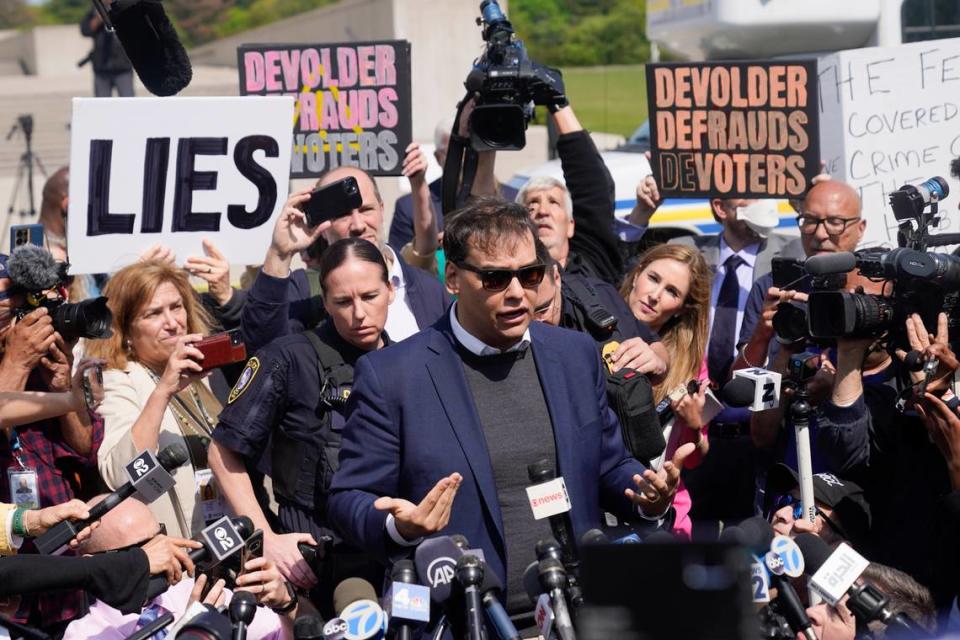
“I have been separated from my wife for over four years,” Ruiz said in January 2023. “Mayra and my kids each have their own financial independence.”
Cash concerns
It can sometimes be hard to distinguish spending by Ruiz and his health-claims company.
Take the example of private jets.
A month before LifeWallet went public in 2022, Ruiz invited Miami reporters to tour his new private jet, a Boeing 767 that had once ferried passengers for the Australian airline Qantas.
The refurbished interior now included a theater, bedroom and shower, conference room, dining room and two lounges with couches that converted to beds, according to the Miami New Times.
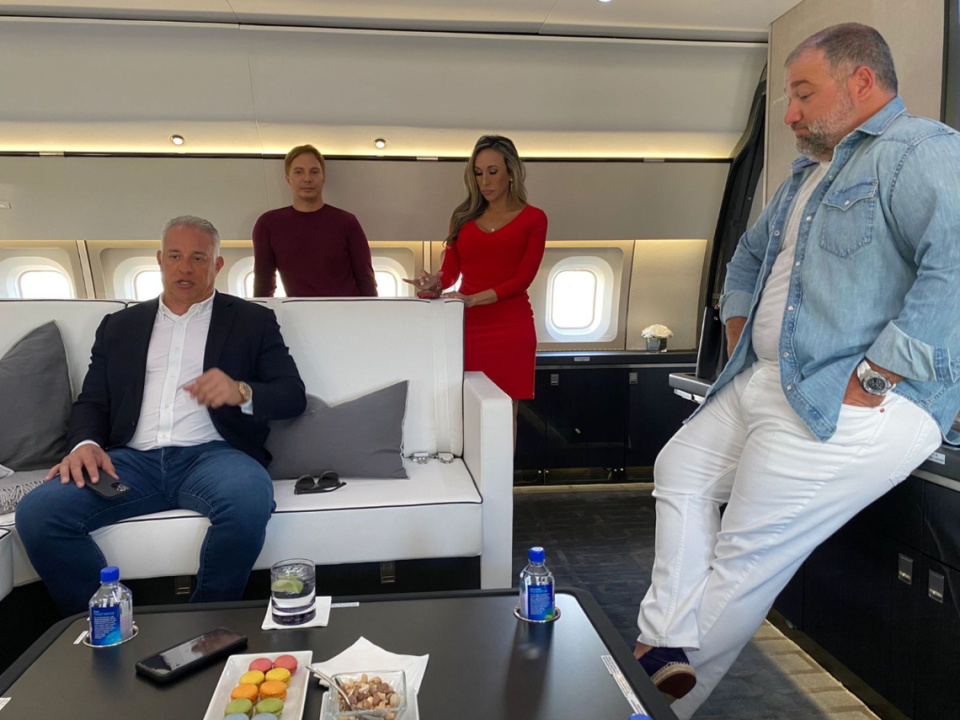
A company called MSP Recovery Aviation, LLC registered the plane with the Federal Aviation Administration a month before MSP Recovery announced that it would go public the following year. But Ruiz said that he is, in fact, the owner of the planes. LifeWallet pays Ruiz’s company for use of the planes, according to the company’s financial filings.
MSP Recovery Aviation, LLC first brought two private jets in 2018 and currently owns three planes, including the Boeing jet, and a helicopter. Ruiz said that his company is currently trying to sell the Boeing plane and the helicopter.
Ruiz’s spending spree in recent years has been all the more striking given his financial condition not long ago.
He had been facing foreclosure on a Coral Gables home and his boat and lost an office building. He and his then-wife Mayra were subject to a 2014 tax lien from the Internal Revenue Services for nearly $30,000 in unpaid federal taxes from 2011 and 2013. And his ill-fated attempt to turn an old baseball stadium in Homestead into a youth sports mecca failed publicly. Ruiz’s company wound up being evicted from the stadium, on the losing end of a lawsuit against the city and the subject of embarrassing stories about the shoddy living conditions of Venezuelan teenagers who had been living in the stadium through a baseball training program leasing space from Ruiz’s company.
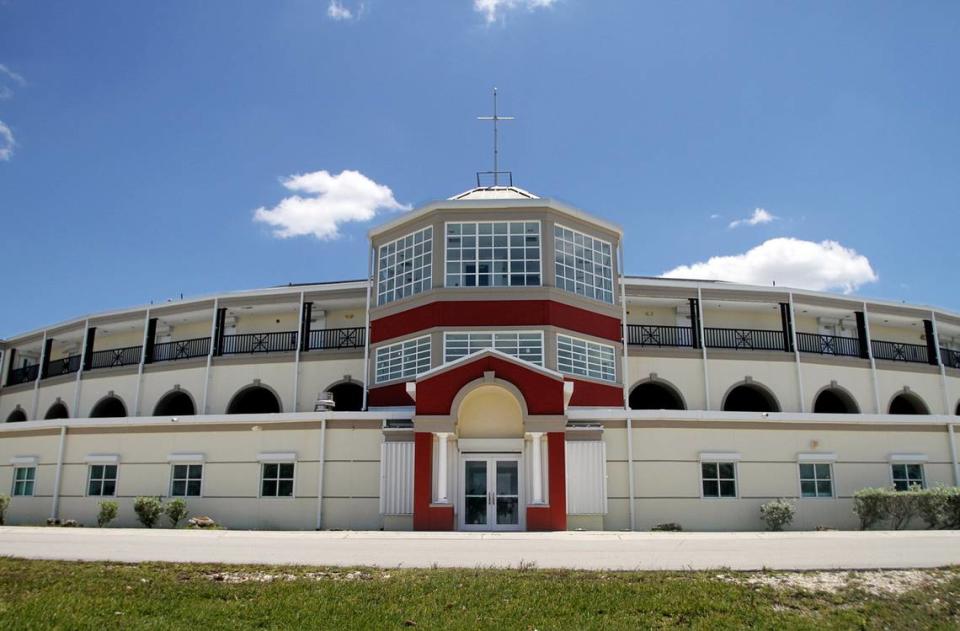
Even as his spending surged, Ruiz seemed to regularly find himself in need of more cash.
While he and his connected companies appeared to pay for most of the properties up-front with cash, he subsequently wound up using many of the properties as collateral for more than $80 million in loans taken out in 2021 and 2022, according to Miami-Dade property records. The most recent homes he sold in the Gables Estates went for millions less than he had initially asked for them — with one selling for two-thirds the original asking price. Ruiz told the Herald he “often acquires real estate through all- cash purchases and occasionally uses the equity in one property to obtain financing for the purchase of other properties.”
In the wake of LifeWallet’s decline, numerous business owners have come forward saying they are owed millions by the company and Ruiz.
Ruiz agreed to buy Titusville, Florida boat manufacturer Vectorworks for $35 million in cash in late 2021, but to date has paid only $15 million, according to a lawsuit that is ongoing. Ruiz said he was persuaded to buy the company under “materially false pretenses.”
And Norberto Menendez, the founder of the company that gave Ruiz’s health-claims company its name, LifeWallet, said in a lawsuit that he is owed $12.5 million.
In text messages from August 2022 produced in the suit, Ruiz indicates that the amount was to be paid in a pre-set amount of company stock that was worth less at that point and is practically worthless now.
“The market is down but will adjust at some point,” Ruiz wrote in August 2022, arguing that Menendez should accept shares as payment. “Again the only reason we are discussing this is bc the stock market is down.”
Menendez insists it was to be cash or a cash-equivalent. Ruiz denies all the allegations in the lawsuit and the case is ongoing.
Canes connections
If Ruiz or his company is charged by federal authorities, it could have major ripple effects across Miami.
Among those who could be impacted are the University of Miami and many of its star athletes.
Ruiz has been front and center in the extensive sponsorship of University of Miami athletes through newly legal Name, Image and Likeness deals, known as NIL, which allow college athletes to collect endorsements and have been a major boon to Miami’s athletic program.
Ruiz celebrated on the court after the men’s basketball team defeated the University of Texas to advance to the Final Four in last year’s NCAA basketball tournament and he regularly touts new deals on social media. He’s been referred to by ESPN and other sports outlets as Miami’s “NIL King.”
LifeWallet has signed deals with Miami quarterback Tyler Van Dyke, All-American safety Kam Kinchens and defensive tackle Leonard Taylor, among many other members of the football team. Guard Isaiah Wong, last year’s Atlantic Coast Conference men’s basketball player of the year, signed a six-figure deal with LifeWallet, and his teammate Nijel Pack turned heads when he signed a two-year, $800,000 deal with LifeWallet that included a car when he transferred from Kansas State in 2022.
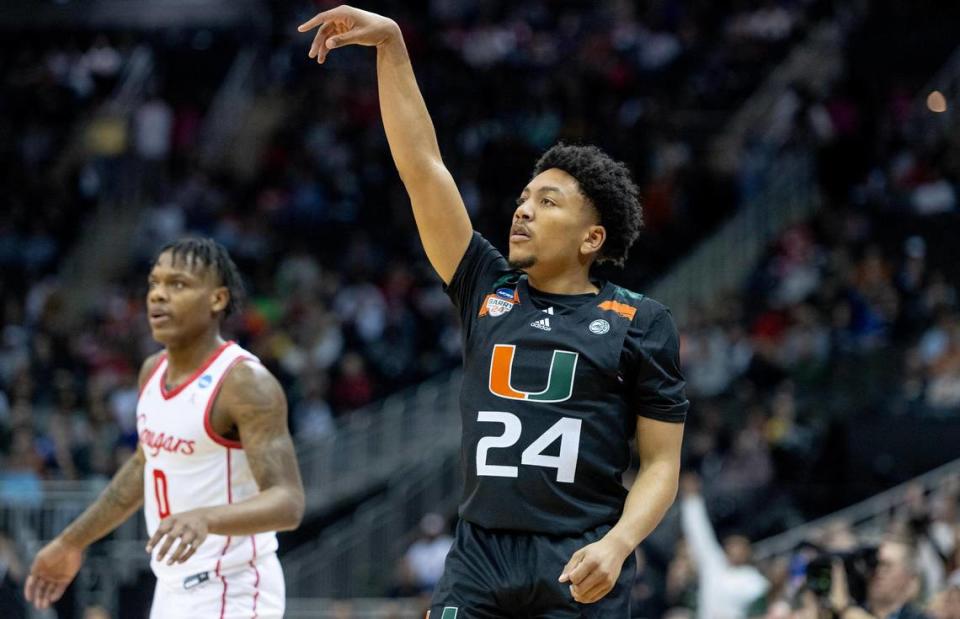
The university did not respond to multiple requests for comment about its relationship with Ruiz but its athletic director, Dan Radakovich, acknowledged to the Herald in May that NIL support from Ruiz and LifeWallet “have been really important.” He added that the university was trying to expand its base of financial support to “supplement those dollars that John has put in with other sources of revenue.”
The financial and legal threats faced by Ruiz and his company could accelerate the university’s need to do so.
Major supporters of the program have had legal problems before. The school’s former top booster, Nevin Shapiro, was sentenced in 2011 to 20 years in prison for fraud. That was before the existence of NIL benefits. Shapiro admitted he used millions of dollars gained illegally from a $930 million Ponzi scheme to write checks to the university and provide impermissible benefits to star athletes, including, he later claimed, spending on strip clubs, cars, trips and an abortion. The NCAA stripped the football and men’s basketball teams of numerous scholarships and put the athletic program on probation for three years.
While the NIL deals LifeWallet has struck with Miami athletes are legal under NCAA rules, Ruiz’s sponsorship activity has already gotten Miami’s athletic program in hot water.
The Miami’s women’s basketball team was sanctioned earlier this year after the NCAA found that Ruiz had provided an impermissible meal to twin sisters Haley and Hanna Cavinder before they had officially committed to transfer to Miami from Fresno State. Ruiz, and the sisters, escaped penalties. Ruiz said the sanctions have had no impact on his relationship with the university.

